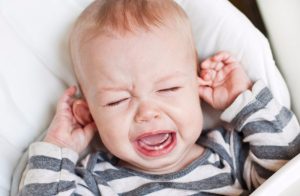Otitis in a child: what to do
 The kid has an earache. He complains or, if he still does not know how to speak, he cries, does not sleep well and does not eat well. Almost every family with children has such symptoms. Otitis, or inflammation of the middle ear, is a very common disease in childhood. Why it arises and how to recognize it, read here.
The kid has an earache. He complains or, if he still does not know how to speak, he cries, does not sleep well and does not eat well. Almost every family with children has such symptoms. Otitis, or inflammation of the middle ear, is a very common disease in childhood. Why it arises and how to recognize it, read here.
In this article we will tell you what to do and what to do absolutely not.
Of course, otitis should be treated, and immediately, because besides the fact that it is very unpleasant and causes acute pain in a child, otitis is also dangerous because it gives complications.
Complications of otitis
If otitis media is not treated, the infection spreads to the ear region, affecting the airway cavity of the middle ear, and otanthritis occurs. Its symptoms are redness, swelling, auricle bulging, temperature increase. Moreover, this process can develop immediately after acute otitis, and maybe a month after it. Untreated purulent otanthritis can cause inflammation of the temporal bone and cause purulent destruction of the bone tissue.
Infection from the ear can also spread to the meninges, causing their inflammation – meningitis.
Untreated otitis media can become chronic and last for years, periodically manifesting with pain and purulent discharge and eventually leading to hearing loss.
Other complications of acute otitis include hearing loss and paresis of the facial nerve.
We treat the child only at the doctor
As a rule, otitis media is conservative, and only a specialist-specialist should appoint it. Since otitis media is a very frequent disease and almost every child has had it in one form or another, for some reason everyone is sure that they know how to treat it. Usually, young mothers are advised on all sides what kind of compresses to put on the ear, what drops to bury, what herbs to water the baby. So, do not listen to any advice, but go to the doctor right away, otherwise you can cause irreparable harm to your child. After all, with different forms, stages and manifestations of otitis, the treatment will be different, and only a specialist will tell you when and what can be done. So, compresses are contraindicated at high temperatures and pus, and ear alcohol drops can not be instilled when the eardrum breaks. And if you use these drugs incorrectly, the child may develop serious complications.
Usually, antibiotics are prescribed for otitis, in the first stage – drops in the ears, at the same time they clean the nasal passages, bury the drops, rinse with saline, remove the mucus with turundums. To reduce the temperature and relieve pain, antipyretic and pain relievers are used.
Warming alcohol compresses and warming up are used only if the child does not have a high temperature and pus flows out of the ear.
When suppuration, the ear canal is periodically cleaned of pus, sometimes ointment is added to it. It is desirable that these procedures are carried out by a doctor. Sometimes, with the threat of complications, pneumomassage and ear blowing are prescribed. At the end of the treatment, physiotherapeutic procedures are carried out, which accelerate the healing process.
With a significant accumulation of pus in the ear, to prevent its penetration to the meninges, it is recommended to remove it surgically, with a breakthrough of the eardrum. This operation is performed in a hospital.
In folk medicine there are many recipes for the treatment of otitis, but before you apply them, be sure to consult your doctor.
Often parents ask whether it is possible to walk with a sick rekbenkom and whether you can bathe him. And you can walk with the baby, and you can bathe it, if your child has a normal temperature, and the weather is warm, not windy and not rainy. Make sure that during bathing the water does not fall into the sore ear, and after bathing the child would be in a warm room.
Is it possible to prevent otitis media?
Here are a few simple rules that will at least reduce the likelihood of developing inflammation.
Properly feed the baby: after feeding, be sure to hold the baby in an upright position for regurgitation. If you use the mixture in the bottle, do not feed the baby in the prone position. Check that the mixture does not get into the nasopharynx.
Every day, clean the nasal passages of the baby, so that they do not accumulate mucus.
From a very young age, teach your child to blow your nose properly: first one nostril, then the other. At the same time, the opposite nostril should be clamped with a finger.
Do not start ORZ; treat your baby for catarrhal diseases in a timely manner, pay special attention to adenoids.
Enhance your baby’s immunity (hardening, exercise, food rich in vitamins and micro and macro elements).
Constantly air the room in which the baby is located. Never smoke in the apartment / house where the child lives.



